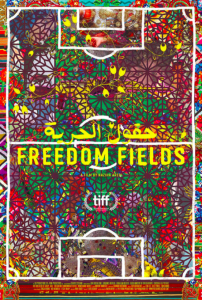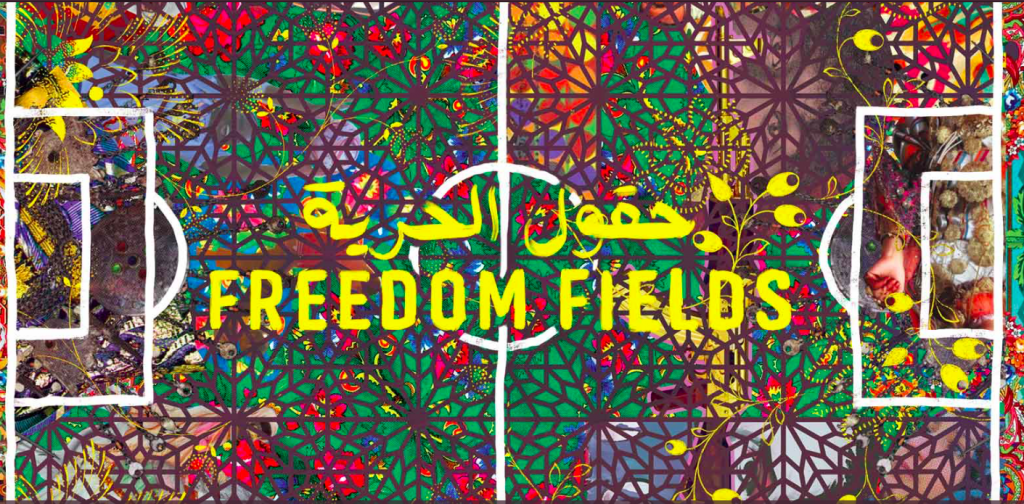
The challenges and harsh realities that face players in the women’s game are fairly well documented WRITES KIERAN THEIVAM. Driving for hours to make training. Dealing with frozen or waterlogged pitches during the winter months. And for the vast majority who are not professional, balancing their job or studies with trying to train and play every week.
But imagine representing a side that has the threat of being assaulted by those that don’t approve of them taking to the field. Or having to train in the middle of the night so that you are not drawing attention to yourself. Or having security fears every time you pull on your boots.
 That is the reality for the Libyan Women’s National Team, who are the subject of a new documentary showing at the London Film Festival, directed by UK born Naziha Arebi.
That is the reality for the Libyan Women’s National Team, who are the subject of a new documentary showing at the London Film Festival, directed by UK born Naziha Arebi.
‘Freedom Fields’ was shot over five years and documents the challenges the group of female players, who had been training together for eight years and never played their first competitive match, as they look to gain acceptance following the end of Muammar Gaddafi’s reign.
What we see in the film is a country that is in awe of football – but football played by men. Barcelona and Real Madrid shirts on the street. Thousands lining roads when Libya are playing in a competitive match. But for the women, who just want to take to the field and play the game they love, it’s not quite as simple.
“Where is the will of god?” one preacher yells to his followers when talking about women playing football and the ‘exposure of their legs.’ The view in Libya, according to one of the players, is ‘to simply be born, grow up, and get married’ – not play football.
A campaign on Facebook, fears of assault, and lack of funding is all things the team have to face up to, and while it would be easier to give in, the team, from different areas and different backgrounds, are determined to ensure they don’t suffer their first defeat before a ball has been kicked.
The film doesn’t just highlight the struggles of the women seeking recognition and time on the field, but also the dangerous environment in which they live in. On more than one occasion while speaking on camera, you can hear the distant sound of guns being fired. And this isn’t one off shots, this is fighting in the street. But it’s all too familiar a sound for those on screen, as they hardly flinch.
This isn’t just a about a group of women who love the beautiful game, it’s about a group of women seeking acceptance and chasing their dream. What once looked like an impossible ambition, post Libya revolution offers them hope. And as one line in the film highlights, “When you give a girl hope, you give her everything.”
She Kicks spoke with director Naziha Arebi about the film, and how it was she came across the story in the first place.
1. How did you come across the story of these Libyan women?
I heard about them through a Muslim women’s sports group in London in 2011; group of Libyan women, a football team that had exited for years but that no one had seen play or ever met, so of course I was intrigued by the mystery. Then when I found them, this incredibly mixed bunch of women, from different social and political backgrounds, different tribes, I was blown away. They were fun, down to earth, feisty and with a wicked sense of humour, so I stuck around, they inspired me, made me part of the team. I couldn’t have stuck at this film if it wasn’t for that relationship.
2. During filming, did you ever feel in danger or under threat? There are a few scenes where you can hear gunfire and there is clear fear amongst some on screen.
I think the thing with a conflict like this is that everyone feels a constant feeling of threat that manifests in different ways, bubbling under the surface. Of course being a filmmaker in those situations, and a female one, you are more exposed, but you also have to be very conscious and responsible with how your camera affects those around you, and their safety, and for me its always important to remember safety first.
In reference to the gunfire, as you see in the film, when you live in such an environment you begin to normalise war, even with humour, to manage, to survive, to breath and live. You have to, to release tensions. Hearing the sounds around you of gunfire and joking that it’s just fireworks, or a wedding, or lads playing real life “call of duty” is standard response as you sip your tea by candlelight, but of course this should not be normal. No one should have to live like this, but for these women, that is their reality.
3. What did you learn about women’s football in the region from your experience? Not just in Libya, but also your interaction with the other countries too?
I learnt that it’s tough, really tough, but then again it’s tough for women in sport, for very different reasons, everywhere. I remind the gals that Manchester United have only just gotten a women’s team in the year 2018!! But I also learnt the value of sport in a place like Libya where daily life tensions run high. Team sports specifically, in a place where you desperately need the release and support of creating your own community, belonging, expression of self and way to breath.
4. What’s the main thing you have achieved / hope to achieve, from telling these women’s story?
Instil hope, inspire girls and young women on and off the pitch both inside and out of the MENA region. I also want to highlight the importance of community spirit and the power of team, in all fields of life; I think in these tense times globally, we all need that. And from another perspective I wish to show an alternative narrative of Libya from what we see in the news, a more human up close understanding of a place the world knows very little about.
5. What do you feel the future of women’s football in Libya looks like?
The women have since left the national team and set up their NGO HERA using sport as a tool for social development. They thought they could do more for the next generation by working outside of the system. So they are working at a grassroots level, using football and sport as an active learning tool, for young boys and girls, in schools, IDP camps and with the scouts (the scouts are the most organised brilliant organisation in Libya, whilst all the various governments fall apart the scouts always pick up the pieces in an emergency, they are wonderful). Team sports obviously has such an impact on a child’s life, and therefore their thinking it will have an impact on society later down the line and hopefully thoughts will start to change. It would be great in the future if they could collaborate with the federation, and feed this work with grassroots back into building clubs and a national team from the base up. But these things are always difficult and take time, but there’s always hope.
6. If you were to encourage readers of She Kicks Magazine to watch the film on its release, what’s the one thing you’d say to them?
Actually we are planning for a UK release around the time of the Women’s World Cup, which would be awesome! So I reckon there should be some interesting community events around that. Go, question, hopefully be inspired by these women as I was; and then go for a kick about with ya pals afterwards!
MORE INFO:
Twitter: @FreeFieldsFilm Facebook: @freedomfieldsfilm Instagram: @freefieldsfilm


